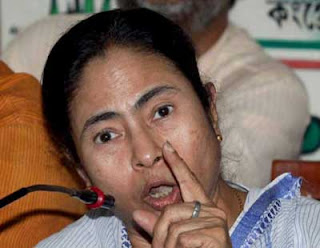First time ever, Mamata Banerjee could transfer her characteristic unpredictable gambit to a larger uncertainty of political economy. Using what matters in Bengal politics, which is a pro-people, pro-minority and anti-Centre stance, she succeeded in showing the UPA-2 its footloose practices to the point of breaking it. In the eye of the storm is the opening of the retail trading for FDI and withdrawal of subsidy for gas and hiking of diesel prices, all a recipe for marginalization of the poor and the minorities in a corporate dominated economy of India.Prasenjit Biswas in Two Circles. Here
Politics of reforms, here again, exhibits its hazy means-ends relationship. No government, howsoever powerful it may be, can assume an overriding decision-making power in matters of bringing foreign funds, as it erodes domestic legitimacy. Bereft of popular acceptance, reform measures that create an inevitable insecurity and crisis in livelihood of ordinary citizen eat into the credibility of the Government. Even if it is a government in majority, or it is in minority, either way, reforms sacrifice both the government and the people. In this sense, reforms make the most achieving government hostage to its antics and throw the stakes of its citizenry into the winds. Mamata decided not to be a part of such a process of gambling with the people and pulled the plug.
In her twenty odd minutes of press conference to declare the withdrawal of support from the Central Government, she established an uncanny but real linkage between Centre’s economic follies with communal riots in Assam. She sounded like a practical politician in linking up the tragedy of commons at the hands of UPA government with its Assam counterpart which could not prevent a preventable riot. That Mamata’s well known acceptance of victims and provisions for sheltering them in relief camps is not just a mere public show off came out in her serious concern about Assam riots, which she didn’t dither to call ‘communal’. Indeed Mamata could see the invisible link between economic reforms and communal politics as it is played out at a stone’s throw by the Congress. Her announcement that her ministers will resign after Jumma Namaz on Friday makes her a darling of the masses in Bengal. Indeed there are many dimensions to her apparently inexplicable act of connecting Assam riots to FDI in retail and the overall policy drift of the UPA.
It is increasingly clear that in the course of riots, Bengali speaking Muslims of the East Bengal origin has been the only target, large number of whom have to cross over to neighbouring state of West Bengal for shelter.
Except making whatever public announcements, Congress as the ruling party, both at the centre and the State didn’t have any qualms to take them back home. Just as the Congress party unilaterally passed a cabinet decision to allow entry of FDI in retail in great peril to the existence of small traders in the very sector, in the same way, they have left scores of displaced victim at the mercy of Bodoland Territorial Council (BTC) administration. The criterion of land record to decide whether someone is an Indian or not in Bodoland not only violates the principle of no harm to the already harmed, but it contributes to turning genuine Indian citizens into stateless persons. The ruling party is dancing to the tune of BTC and failing to uphold constitutional principles.
In such an hour of crisis, Mamata not only withdrew support from UPA, but by raking up the issue of communal riots in Assam, she brought the truth out of claustrophobic interpretations given to Bodoland riots. Although she didn’t elaborate, but anyone can relate mention of protesting against Assam communal riots to the actually existing reality. As a glaring example of how UPA’s policies are skewed towards the marginalized and minority-ized sections of society, Assam riot stands out as one example of neglect and injustice by the Central Government.
As a statesman of a very different kind who can listen to the ground, her decision to send minister’s resignation to the Prime Minister after Friday prayer carries a lot of meaning both nationally and internationally. Nationally it marks a strong anti-Hindutva stance. It also communicates a message of peace, brotherhood and love for the Muslims that a country polarized tends to forget. It also is a re-affirmation of solemnity of Islam in the face of deliberate attempts to the film-ic mischief. Mamata establishes the right chord of concern for the helpless victims of communal clashes in Assam by connecting her FDI protest with deeply emotional pronouncements about Friday resignations. She couched the idiom of protest in terms of practical Islam that overcomes the otherwise meaninglessness of political acts such as entry and exit.
Mamata’s exit has thrown up challenges to other secular and anti-communal forces and parties to evolve a common strategy. Far from being clear about the impact of these reforms, parties like Samajwadi Party and Bahujan Samaj Party are calculating each other’s response and playing a zero sum game. In such a situation there could again be a kind of reconsolidation of parties within UPA just for the sake of avoiding an early election. Such a mutual bickering is going to affect the polity in a negative way as continuation of UPA is going to bring a policy regime that does not care for the minorities and the marginalized.
Thursday, September 20, 2012
Mamata Bannerjee steals the thunder from UPA-II
Subscribe to:
Post Comments (Atom)

No comments:
Post a Comment